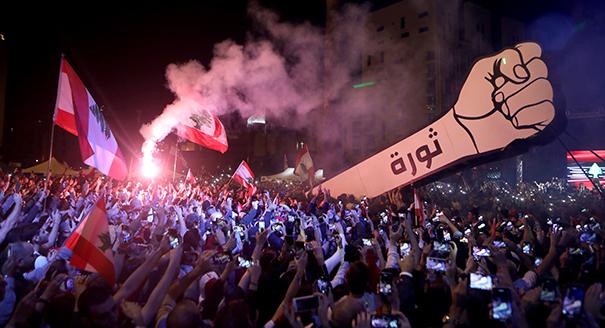Since the resignation of Lebanon’s government on August 10 last year following the devastating blast in Beirut Port, the Lebanese political class has been moving from one quandary to the other. The country’s pain has deepened as a majority of the population has fallen below the poverty line. The value of the Lebanese pound has collapsed, so that $1.00 is now equivalent to over LP10,000, while the official exchange rate is still at $1.00 equivalent to LP1,500.
In the past seven months, there have been multiple reasons for why the political class has delayed forming a government. This has included disagreement over granting the two Shi‘a parties, Hezbollah and Amal, the finance portfolio, President Michel Aoun’s insistence on holding a blocking third in any new government, and prime minister-designate Saad Hariri’s refusal to hand the Interior and Justice Ministries over to Aoun and his son in law Gebran Bassil.
However, these excuses are becoming less and less convincing. The three major forces in the government-formation process—Hariri’s Future Movement, the Shi‘a parties, and Aoun’s and Bassil’s Free Patriotic Movement—are all hesitant to form a government, each for its own reasons. These range from their reading of regional geopolitical realities to their self-interest and political ambitions. They are all taking part in a spectacle bordering on the ridiculous.
Hariri has said that he would like to form a government to implement the French initiative brought to Beirut by President Emmanuel Macron last September. The plan calls for the formation of a “working government” that can implement reforms, which in turn would unlock foreign aid to Lebanon. Yet Hezbollah is not keen to form a government under the French plan, since its patron Iran prefers to deal directly with the United States over Lebanon, rather than with Paris. Hezbollah, in trying to accommodate Tehran, has not sought to break the deadlock in the cabinet formation process.
Iran and Hezbollah also remain wary of the impact of regional shifts after the Abraham Accords between Israel, the United Arab Emirates, and Bahrain, as well as of the nature of a final settlement in Syria. Russia’s relations with Israel have facilitated coordinated Israeli airstrikes on Iran and its allies in Syria. At the same time, Moscow has exploited its relations with certain Gulf states, such as the UAE and Bahrain, to improve their relations with the regime in Damascus. Iran’s primary concern, or fear, is that its presence in Syria will be sacrificed on the altar of Arab reconstruction aid to the country and a normalization of relations between the Gulf states and Damascus, which hypothetically may extend to Israel. Therefore, holding Lebanon hostage increases Iranian leverage with the United States, and to an extent France. By maintaining uncertainty in Lebanon, Hezbollah is signaling that Iran is in charge of its destiny, no one else.
Aoun also does not want a new cabinet that would be formed under the conditions set by Saad Hariri. Instead, he wants to have enough leverage over it to secure the presidency for Bassil after Aoun’s mandate ends in 2022. The president and Bassil had sought veto power over any new government, to put Bassil in a powerful position for the presidency. That demand has since been dropped, given the wave of opposition from across the political spectrum. However, that only makes Aoun less enthusiastic about a government today.
At the same time, Aoun’s alliance with Hezbollah is not solid enough to secure the party’s support for Bassil’s presidential ambitions. This has made the president more insecure about his son in law’s political future and about his own disintegrating legacy, which is why he is uneasy about a government that would fail to meet his terms.
Another major problem for Aoun and Bassil is whether they will be able to retain control of the Energy Ministry. If they do not get the portfolio for the first time in over a decade, this could have political implications. Any reforms in the energy sector under a non-Aounist minister would highlight Bassil’s responsibility for Lebanon’s disastrous electricity situation.
Saad Hariri’s calculations are not very different from Aoun’s. Saad’s brother Bahaa, who had not been involved in Lebanese politics, made a comeback in 2017 and has been slowly building his base and securing media influence. He has adopted a critical attitude toward his brother and his concessions to Hezbollah, despite the party’s apparent role in the assassination of their father, Rafik, in 2005. Saad’s attempt to rebuild his ties with Saudi Arabia and improve his financial situation have failed. Basically, if he concedes to Hezbollah and Aoun on the finance, interior, and justice ministries, he may face Saudi opposition, which could increase his brother’s influence.
In addition to all these reasons, the political class in general does not appear eager to form a government, as it would need to implement painful reforms in order to unlock foreign aid. The country’s leaders would prefer a bailout in the context of a shift in regional or international politics, as the requested reforms today would require them to give up their leverage and patronage networks in the system.
By the same token, a consensus government would revive the narrative of the October 17 uprising, namely that the whole political class is responsible for the calamitous state of affairs in Lebanon. Therefore, the delay in the government is the result of a collective choice, and the politicians’ blame game is merely an act. Ultimately, they prefer to allow the current caretaker government of Hassan Diab to take the explosive step of lifting the remaining subsidies on vital goods. Only then would a new cabinet step in and pick up the pieces, preferably within the context of some sort of U.S.-Iran understanding. The political class views procrastination as the most suitable policy to serve its interests and those of its patrons abroad.








